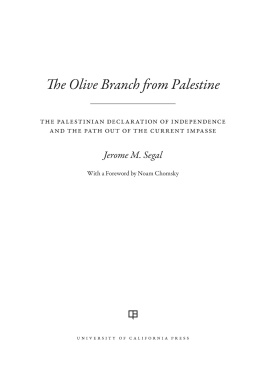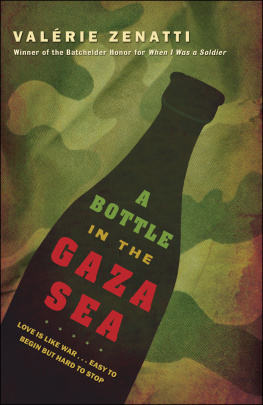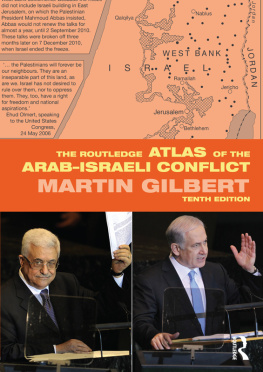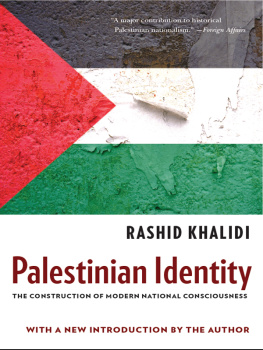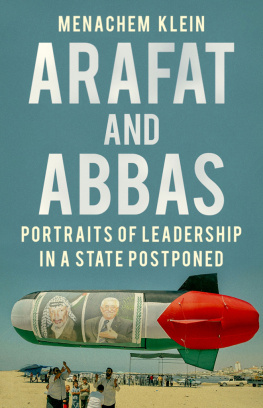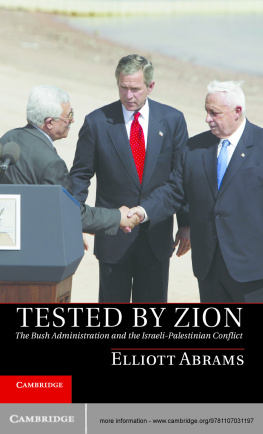Arafats War
Arafats War
The Man and His Battle for Israeli Conquest
Efraim Karsh

Copyright 2003 by Efraim Karsh
All rights reserved. No part of this book may be reproduced in any form or by any electronic or mechanical means, including information storage and retrieval systems, without permission in writing from the publisher, except by a reviewer, who may quote brief passages in a review. Any members of educational institutions wishing to photocopy part or all of the work for classroom use, or publishers who would like to obtain permission to include the work in an anthology, should send their inquiries to Grove/Atlantic, Inc., 841 Broadway, New York, NY 10003.
Published simultaneously in Canada
Printed in the United States of America
FIRST GROVE PRESS PAPERBACK EDITION
Library of Congress Cataloging-in-Publication Data
Karsh, Efraim.
Arafats war: the man and his battle for Israeli conquest I Efraim Karsh.
p. cm.
Includes bibliographical references (p.) and index.
eBook ISBN-13: 978-1-5558-4660-2
1. Arab-Israeli conflict1993Peace. 2. Al-Aqsa Intifada, 2000
3. Arafat, Yasir, 1929 I. Title.
DS119.76.K27 2003
956.94054dc2 1
2003049079
Grove Press
an imprint of Grove/Atlantic, Inc.
841 Broadway
New York, NY 10003
04 05 06 07 08 10 9 8 7 6 5 4 3 2 1
Contents
Introduction
Our ancestors fought the crusaders for a hundred years, and later Ottoman imperialism, then British and French imperialism for years and years. It is our duty to take over the banner of struggle from them and hand it on untarnished and flying as proudly as ever to the generations that come after us.
Yasser Arafat, August 1968
Struggle, Brother Ceauescu! Armed struggle and terror are the only things America respects.
Yasser Arafat finished his speech and gobbled down a dripping baklava that he dunked into a jar of honey. It was the spring of 1978, and he had just arrived in Bucharest, via Ceauescus presidential airplane, for an urgent meeting with the Romanian dictator. The two had forged an exceptionally close and warm relationship since they had first met in the late 1960s, and Ceauescu was now trying to convince Arafat to feign moderation so as to allow the Palestine Liberation Organization (PLO) to join the nascent Egyptian-Israeli peace negotiations.
How about pretending to break with terrorism? he suggested. The West would love it.
Just pretending, like your own independence? Arafat responded, alluding to the sustained deception campaign conducted by Ceauescu since 1972, code-named Operation Horizon, which sought to convince the West of Romanias political independence from the Soviet Union and thus extract substantial economic, military, and technological support.
Exactly. But pretending over and over. Political influence, like dialectical materialism, is built on the same tenet that quantitative accumulation generates qualitative transformation.
Im not the expert on Marxism that you are, Brother Ceausescu.
Dialectical materialism works like cocaine, lets say. If you sniff it once or twice, it may not change your life. If you use it day after day, though, it will make you into an addict, a different man. Thats the qualitative transformation.
A snort of a pacifist Arafat day after day ?
Exactly, Brother Arafat. The West may even become addicted to you and your PLO.
Thats not easy.
Do you think its easy for me to have to sneak off secretly to Moscow, when I used to be received there with fanfares and the trooping of the guard?
I dont mind coming here secretly, Brother Ceausescu. Thats for our cause. But we are a revolution, not a government. We were born a revolution, and we should remain an unfettered revolution.
And you will remain a revolution. The only thing I want to change is the nameplate on your door from the PLO into a Palestinian government-in-exile.
Arafat then launched into a lengthy peroration. He argued that the Palestinians lacked the tradition, unity, and discipline to become a formal state. That a Palestinian state would be a failure from the first day. That it was only something for future generations to consider. That he could not put any laws or other obstacles in the way of the Palestinian struggle against Israel. Ceausescus claim that he would be able to sustain his war of terror against Israel behind the respectable facade of a Palestinian government-in-exile failed to impress Arafat. Promising to give the matter serious consideration, he abruptly changed subjects. I need some more blank passports from you, Brother Ceausescu. A hundred Israeli, Jordanian, west European. A few American ones, if you can.
One decade later, in November 1988, the Palestinian National Council (PNC), the PLOs semi-parliament, grudgingly accepted General Assembly Resolution 181 of November 29, 1947, calling for the creation of Jewish and Arab states in the territory of Mandatory Palestine, and Security Council Resolution 242, issued in the wake of the Six-Day War of 1967 and recognizing Israels right to exist. Five years later, on September 13, 1993, Arafat signed the Declaration of Principles on Interim Self-Government Arrangements (known as DOP, or Oslo I) with the Israeli government, in which the PLO renounced the use of violence and committed itself to a peaceful quest of a settlement with Israel.
Yet both these turning points, remarkable as they appeared at the time, were belated attempts in the face of great adversity to act in the manner suggested by Ceausescu, a desperate bid to transform Arafats image in Western and Israeli eyes from a hardened terrorist to a man of peace, providing a handy facade behind which he could sustain his dogged quest for Israels destruction.
In the fifteen years between the meeting in Bucharest and the signing of the DOP, the PLO saw a sharp decline in its fortunes. Its humiliating expulsion from Lebanon in 198283first by Israel, then by Syriaand its consequent move to Tunisia had effectively eliminated the organizations military capabilities and seriously constrained its political maneuverability. Then came the 199091 Gulf conflict and the suspension of all financial aid and political backing by the Arab oil states, following Arafats staunch support for Saddam Husseins brutal occupation of Kuwait. By the early 1990s, the PLO had become a regional pariah, with Arafat on the brink of political extinction.
These developments were further compounded by the collapse of the Communist bloc in the late 1980s, as well as the 1991 disintegration of the Soviet Union, the PLOs foremost patron. Ceausescus overthrow by a spontaneous popular uprising, and his summary execution, were particularly traumatic for Arafat, not only because of the loss of a trusted friend and collaborator but also because it served as a potent reminder of the ultimate penalty for political miscalculation. As a result, when in late 1992 the Israeli government, headed by Yitzhak Rabin, offered Arafat a lifeline in the form of secret peace negotiations in Oslo, it was hardly surprising that the Palestinian leader seized the moment with alacrity.
Arafat thus committed himself to peace with Israel in the DOP and a string of follow-up agreements, but his actual behavior in subsequent years clearly revealed that beneath the rhetoric of compromise lay the commitment to violence and to an ultimate victory, now fueled by Western indulgence and Israeli accommodation. It should have been clear from the outset that Arafat does not see Oslo as an instrument of historic reconciliation but as a means of bettering his position, the Israeli journalist Ehud Yaari wrote in October 1996, shortly after the Palestinian leader had unleashed his troops on their Israeli peace partners:
Next page

